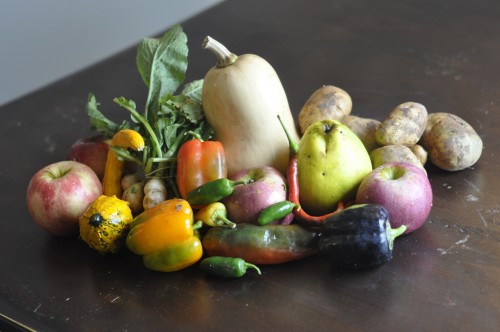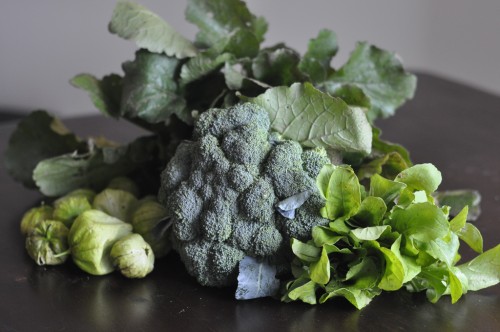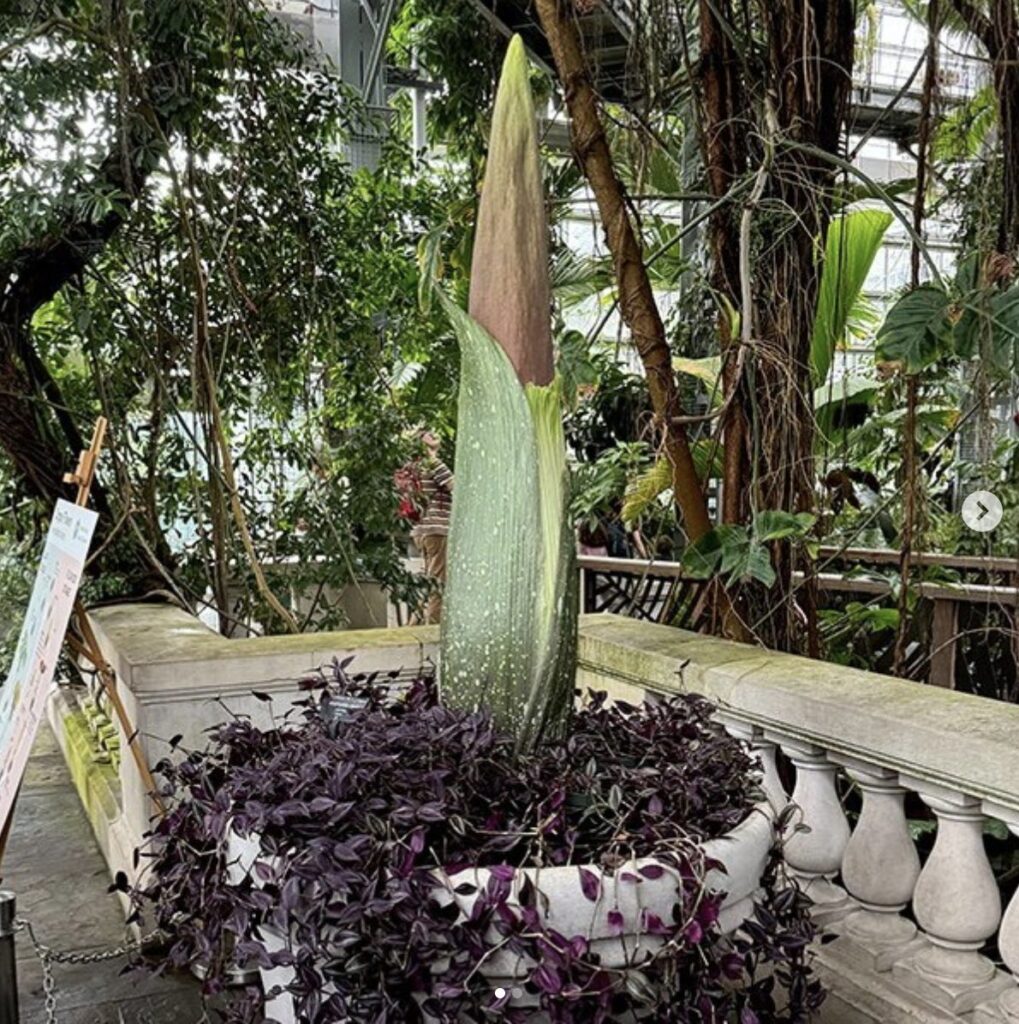
Week 3 of the Licking Creek Bend fall 2009 CSA share included Apples, Hot Peppers, Quince, Butternut Squash, Potatoes, Kohlrabi, and Ornamental Squash – plus greens
John Reinhardt is an urban planner, writer, photographer, and urban gardener. An avid cook, John is interested in the intersection of urban design, sustainability, and food systems planning. He currently resides in Washington DC and works for the American Planning Association. He currently writes Grown in the City, a blog about urban gardening and food systems planning.
So maybe you don’t have the time, space, or inclination to start your own urban garden, but still have the desire for fresh, high-quality local food. And wouldn’t it be great to skip the lines at Giant, have your shopping for the week done in five minutes, and simultaneously support the local food systems economy? There’s an option – Community Supported Agriculture.
From the USDA:
Community supported agriculture (CSA) is a new idea in farming, one that has been gaining momentum since its introduction to the United States from Europe in the mid-1980s. The CSA concept originated in the 1960s in Switzerland and Japan, where consumers interested in safe food and farmers seeking stable markets for their crops joined together in economic partnerships.
In basic terms, CSA consists of a community of individuals who pledge support to a farm operation so that the farmland becomes, either legally or spiritually, the community’s farm, with the growers and consumers providing mutual support and sharing the risks and benefits of food production. Typically, members or “share-holders” of the farm or garden pledge in advance to cover the anticipated costs of the farm operation and farmer’s salary. In return, they receive shares in the farm’s bounty throughout the growing season, as well as satisfaction gained from reconnecting to the land and participating directly in food production. Members also share in the risks of farming, including poor harvests due to unfavorable weather or pests. By direct sales to community members, who have provided the farmer with working capital in advance, growers receive better prices for their crops, gain some financial security, and are relieved of much of the burden of marketing.
So where do you find a CSA? Local Harvest has a fantastic website that provides information about different CSA models, and provides links directly to CSA’s in your area, based on your ZIP code. I’m a member of Licking Creek Bend Farm, and help support the efforts of a great guy, Michael Tabor. I get to chat with him each Saturday morning when I go pick up “my box” in Adams Morgan, at the market on 18th and Columbia. He gives me the inside info on which apples are the best, or how to prepare the kohlrabi that’s in the box. This past week, they ran a farm tour for subscribers, and they do a Halloween pumpkin patch tour for kids. As the USDA says, it’s like having a community farm next door, only your farmer neighbor lives in Pennsylvania. It’s relatively inexpensive as well – each week I got a box of farm-fresh produce (and apple cider in the fall) for what amounted to about $40 a week. I felt good knowing where my money was going, and where my food was coming from – a true local economy.
Continues after the jump.

Week 3 of the Licking Creek Bend fall 2009 CSA share included Tomatillos, Broccoli, Lettuce, and Kale.
Michael has introduced me to kohlrabi, pak choi, and quince – items I wouldn’t have tried on my own (or can’t find in the supermarket). One of the questions I always hear when I tell people I belong to the CSA is “I heard you get a lot of kale. What do I do with all that kale?” While this isn’t entirely true (at least from my CSA), you do receive a lot of items, all at one time, that you may not know what to do with. In that vein, my colleague Kim Hodgson started her own blog about cooking from a CSA box. We both subscribed to the same farm, and each week, we wrote about what we made from the same CSA box. The results were interesting, and gave us each ideas about how to creatively “use all those greens.”
More info on CSAs can be found here.
Recent Stories

Photo by Clif Burns Ed. Note: If this was you, please email [email protected] so I can put you in touch with OP. “Dear PoPville, Hey – you stopped me while…

Unlike our competitors, Well-Paid Maids doesn’t clean your home with harsh chemicals. Instead, we handpick cleaning products rated “safest” by the Environmental Working Group, the leading rating organization regarding product safety.
The reason is threefold.
First, using safe cleaning products ensures toxic chemicals won’t leak into waterways or harm wildlife if disposed of improperly.

Looking for something campy, ridiculous and totally fun!? Then pitch your tents and grab your pokers and come to DC’s ONLY Drag Brunch Bingo hosted by Tara Hoot at Whitlow’s! Tickets are only $10 and you can add bottomless drinks and tasty entrees. This month we’re featuring performances by the amazing Venus Valhalla and Mari Con Carne!
Get your tickets and come celebrate the fact that the rapture didn’t happen during the eclipse, darlings! We can’t wait to see you on Sunday, April 21 at 12:30!
Frank’s Favorites
Come celebrate and bid farewell to Frank Albinder in his final concert as Music Director of the Washington Men’s Camerata featuring a special program of his most cherished pieces for men’s chorus with works by Ron Jeffers, Peter Schickele, Amy
Cinco de Mayo Weekend @ Bryant Street Market
SAVE THE DATE for Northeast DC’s favorite Cinco de Mayo celebration at Bryant Street NE and Bryant Street Market!
Cinco de Mayo Weekend Line up:
Friday, May 3:






